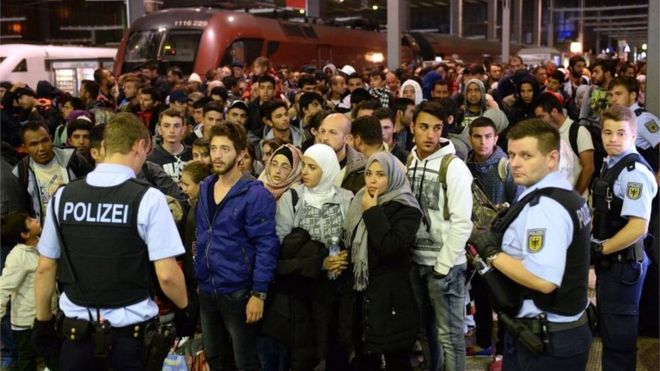‘If we want Germans to accept Arabs, Arabs must also learn to accept them’ was the title of a newspaper article that highlighted the cultural lessons being run for new refugees who arrived in Germany. “We talk about homosexuality, which a lot of my course members tend to see as criminal. I go on to explain to them that Germans don’t see it that way and that they will have to accept that if they want to live here,” said their course teacher, an immigrant from Egypt who had lived in Germany for many decades. They are warned that their children will have more independence if they grow up Germany than they might have expected in the Arab world. He also said, “Arabs are often shocked here when they see the Bavarians go swimming naked in the River Isar. But I tell them that if they want the Germans to accept Arab women wearing headscarves then they must accept Germans sunbathing and swimming naked in public parks and rivers.” How can new Muslim immigrants who have just arrived navigate these new challenges to their understanding and practice of Islam?
Comment:
This is actually not a new challenge. The Muslims who emigrated to Western countries from Africa, Asia, and the Middle East all faced this challenge, and it is an on going challenge faced by their children and grandchildren growing up in any Western society. New Muslim arrivals believe in a Creator, Who gave humans guidance by which to live in all areas of life and believe that He سبحانه وتعالى will account us on the Day of Judgement; hence we need to abide by what He سبحانه وتعالى has ordered and leave what He سبحانه وتعالى has forbidden. Suddenly they arrive in societies where the majority disbelieve in a Creator, believe in freedom instead of accountability to the Creator and judge what to do or abstain from based on benefit or harm. In addition, what is classified as good and bad are ever changing!
A few Muslims say we must isolate from the wider society and reject everything from it in order to preserve our Islamic identity. Others preach assimilation and say that since we reside in the West, we need to abandon parts of Islam in order to fit in. So we should accept same-sex marriage, forgo the clear roles Islam has defined for men and women and generally leave the Islamic practices or thoughts whenever they contradict with fundamental secular ideals of the western societies we live in. In short, they advocate a ‘secular’ Islam that is reduced to prayer, fasting and other personal matters only and which also diminishes any link to being part of a global Ummah.
Looking at the life of the Prophet ﷺ in Makkah, isolation from neighbours, work, colleges and the wider society is not the Islamic path because that was not his ﷺ practice in Makkah although him and his companions were in the minority. Neither did he and his companions adopt every practice of the Quraysh, so assimilation is also not an option for us. Rather he ﷺ navigated by showing us that Islam must be the reference point for deciding whether to adopt some new action, idea, way of buying, way of parenting or way of relating to the wider Islamic Ummah. Using the criteria of accepting and doing what is halal and rejecting and doing what Allah سبحانه وتعالى says is haram is one of the very important concepts Muslims in the West must teach and reiterate amongst themselves. We need to spread the mentality of asking and finding the Islamic rule for specific actions we want to undertake, before undertaking them, and remember that all actions will count for or against us and the excuse of living in the West will not stand. Allah سبحانه وتعالى says,
فَمَن يَعْمَلْ مِثْقَالَ ذَرَّةٍ خَيْرًا يَرَهُ * وَمَن يَعْمَلْ مِثْقَالَ ذَرَّةٍ شَرًّا يَرَهُ
“So whoever does an atom’s weight of good will see it, And whoever does an atom’s weight of evil will see it.”
(Surah al-Zalzalah, 99:7-8)
By using halal and haram as a criteria and being ambassadors who invite people around us to our Great Deen, a Muslim can navigate the many challenges of living in the West whilst proudly holding and inviting others to our Great Deen which solves human problems where people reside – something many non-Muslim westerners are searching for.
Taji Mustafa
Media Representative of Hizb ut Tahrir in Britain

